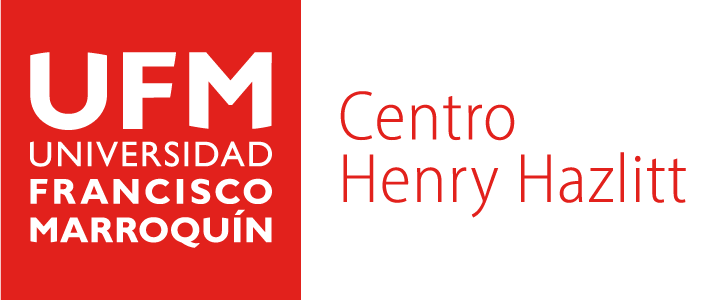What Do We Do and How Do We Teach?
All Universidad Francisco Marroquín students, regardless of their degree course, learn what liberty is; the importance of private property, free markets, social cooperation, competition, and the division of labor; how man went from living in tribes to today’s societies; the importance of the rule of law and its relationship with the full development of a society; the effects of government interference in life in society; the whys and the consequences of human action; economics from the perspective of the Austrian school of economics, and other economics-related topics of interest.
In this way, the courses taught by Henry Hazlitt Center help fulfill the mission of teaching and disseminating the ethical, legal, and economic principles of a society of free and responsible persons.
Ethics of Liberty
The purpose of this course is to bring the student closer to the ideas of classical liberalism through a discussion of the basic concepts of an ethical system that promotes free and voluntary exchanges.
Among the topics explored are: morality, human action, means and ends, freedom and responsibility, property, rule of law, the role of government, equality and inequality, and justice.
Students are encouraged to reflect on these and other concepts, and to discover the importance of these ideas in their lives and the influence they have on society.
Know the topics and methodology
Economic Process I
This course focuses on social cooperation between individuals and the resulting spontaneous order that guides people to satisfy their goals, using the means they have available.
Economic concepts are studied from the perspective of the Austrian school of economics. Among them are: the division of labor, price system, opportunity cost, subjective theory of value, trade, the capitalization process, the labor market, and the importance of entrepreneurship.
Know the topics and methodology.
Economic Process II
The purpose of this course is to study the origin and function of money and banking, and the effect of government intervention on the economy.
Among the topics studied are: origin of money, its functions and its transformation; the evolution and role of commercial and central banking, contrasting them with free banking; the function of government, taxes and how they relate to the budget; the effects of government intervention in markets; economic cycles; socialism and why this system makes economic calculation impossible.
In Economic Process II, students analyze past and present economic problems, comparing the solutions offered by a government-controlled economy versus the free market.
Know the topics and methodology.
Philosophy of Hayek
The aim of this course is to study life in society: how the institutions that allow for coexistence emerged; the reason for cooperation between individuals and what role the government plays in civilized life.
This course studies the work of Friedrich A. Hayek with a particular focus on his book The Constitution of Liberty. Students contextualize Hayek’s work and the impact of his ideas; identify and explain the differences between the British and the French tradition as regards the concept of liberty; the meaning of spontaneous and deliberately created order; the limits of human reason and the role of government in society; laws and the importance of the rule of law.
Know the topics and methodology.
Philosophy of Mises
The purpose of this course is to study the work of Ludwig von Mises; learn about his ideas on topics such as the categories of human action, uncertainty, human cooperation, and society; means, utility, and economic calculation; the goals and foundations of liberalism; etc.
This course studies praxeology, the distinctive methodology of the Austrian school of economics, which is based on the principle that human beings perform conscious actions to advance their chosen objectives.
Students analyze the implications and consequences that arise when individuals act, as expressed by Mises in his work.
Know the topics and methodology.
Economic Process Seminar
The Economic Process Seminar (SPEC, for its acronym in Spanish) is the last course that students take at Centro Henry Hazlitt. The main purpose of SPEC is for students to integrate the knowledge they have gained in previous courses and apply it in a critical analysis of current social problems.
SPEC has a list of topics that are taught across all academic disciplines, such as public choice theory, the labor market, and stock market investing. Additionally, each academic discipline has a list of topics specific to their field.
In this way, students also get to apply their knowledge to their particular degree, while also applying it to topics of general interest.
Know the topics and methodology.
